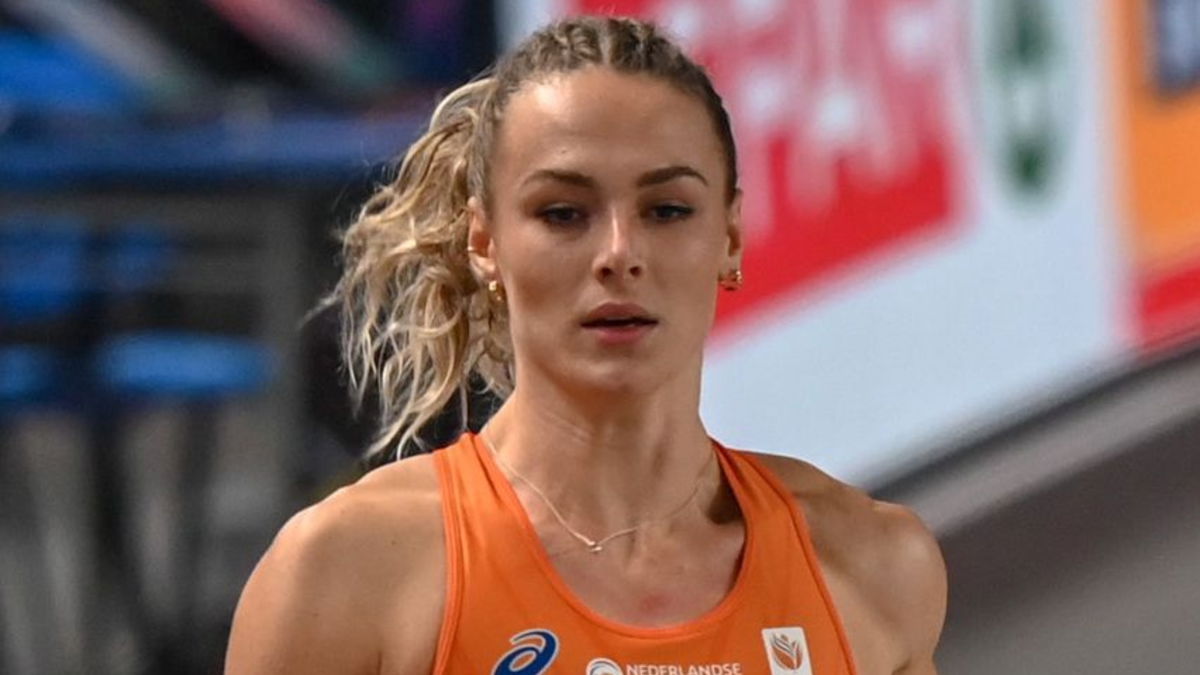

To think that Lieke Klaver went from winning the gold in the 4x400m mixed relay to not qualifying for the 400m final in the span of a couple of days! Unfortunately for the Dutchwoman, that’s what happened. And although that was a result of finishing fourth in her semifinal, Klaver could’ve been written off even before her race started. But she wasn’t, and that seemed odd to many.
Watch What’s Trending Now!
Lining up for the semifinal on August 7, Lieke Klaver appeared ready on her marks, but once the gun went off, she failed to take off, sitting back down in the crouching position. As a result, she deliberately interfered with the proceedings. Considering this, many believed she should’ve been disqualified straight away. But when the referee came up to her, the two had an extended conversation, and the official seemed pleased with Klaver’s reasoning for missing the start. They returned to the track with a yellow card, giving the Dutchwoman a warning.
Per Rule 18.5 of the World Athletics’ competition rule book, “Referees have the authority to warn or issue a yellow card to an athlete for displaying unsporting or improper conduct.” In Lieke Klaver’s case, this seems to be what happened, as well as failing to follow the race starter’s instructions. As per Rule 16.5.1, “Where an athlete in the judgment of the starter, after the command ‘on your marks’ or ‘set,’ and before the report of the gun, causes the start to be aborted without a valid reason, the starter shall abort the start.” However, Klaver caused an aborted start after the gun went off.
ADVERTISEMENT
Seeing as the rule book doesn’t say anything about missing the start after the gun goes off, they may have given Lieke Klaver the benefit of the doubt. But not before showing her the yellow card. What was an already nervy situation became more tense after this, as everyone lined up on their blocks again, waiting for a proper start. While the second start happened without hiccups, the lap around the Stade de France wasn’t what the Dutchwoman hoped it’d be. She finished fourth with a time of 50.44 seconds, running well below her capabilities, as she shared after the race.
“I thought the starter waited too long [before the subsequently aborted start]. But I don’t know what went wrong. The start was poor, the middle part was poor, and the final stretch was poor. I just don’t know and want to cry with my coaches,” she said. Running alongside her in the first semifinal was Salwa Eid Naser, who clocked in a decisive time of 49.08 seconds to take victory. She was followed by Rhasidat Adeleke’s 49.95-second run, making her the first Irish female to ever qualify for an Olympic sprint final. And, well, even she wasn’t too pleased with what happened at the start.
ADVERTISEMENT
“It was a messy race,” Adeleke remarked. However, echoing Klaver’s sentiment about the first start, she said, “The first time they held was really long, and I think I was ready to go again. But when we went again, I just felt like I was thinking about it too much and didn’t execute my first 200m like I should’ve. And I also think I panicked a little, which made me break form pretty early.”
Klaver stayed in her block there for some reason. Gets a yellow card. Just adding to the tension.
— Daniel Hussey (@DanielHussey2) August 7, 2024
ADVERTISEMENT
Coming back to Lieke Klaver. After waiting for the two other semifinals to conclude, her fears came true. In the third semifinal, the third and fourth-place finishers were faster; thus, Klaver missed the final spots. She posted the 10th-fastest time across all the semifinals, but seeing as only the top 8 qualify, the 25-year-old had to settle for a disappointing 400m campaign in Paris. But that’s the thing. Not everyone believed she should’ve even gotten the chance to compete.
The decision to issue a yellow rather than a red card (disqualification) sparked considerable debate on X. Many users questioned why the latter wasn’t given and voiced their frustration over the perceived leniency. This added to the mounting tension and excitement of the race, causing fans to erupt in frustration and agitation.
ADVERTISEMENT
Fans equate Lieke Klaver’s controversial conduct to “playing games”
One fan remarked, “Race should’ve continued without Klaver. She got lucky.” As mentioned earlier, in track and field, covering all track, field, and out-of-stadia events, unsporting behavior is managed using yellow and red cards. In the 25-year-old’s case, the referee felt her reasoning was valid – maybe it was because the starter held them for too long, just as Rhasidat Adeleke pointed out. However, that didn’t make the Irishwoman (or anyone else) miss the start. So, Lieke Klaver may just have gotten lucky.
Sharing this sentiment, another highlighted the missed start’s effect on the other athletes: “That semi should’ve gone off with Klaver being left in the blocks. She sat back down, no raised hands. Huge adrenaline release and mental hurdle for the rest of the runners.” Per the rules, a runner can only cause the starter to abort the start before the gun goes off. Since she didn’t do that, it should’ve resulted in a red card. The missed start was as good as a false start, per fans.
Top Stories
Travis Kelce Confirms Retirement Stance as Chris Jones Makes Bold Claim on Chiefs TE’s Future

Furious Lamar Jackson Confirms Stance on Ravens Future as John Harbaugh Blames Tyler Loop for Playoff Exit

Jimmy Haslam Breaks Silence on Kevin Stefanski’s Firing As Browns Decide GM Andrew Berry’s Future

Pete Carroll Makes Final Decision on Retirement as Tom Brady Set to Fire Raiders HC

Jake Paul Officially Under Medical Suspension After Broken Jaw Surgery

Brian Schottenheimer Issues Strong Warning to Cowboys After Jerry Jones Assigned Blame

Just a few days ago, Aaron Brown didn’t receive the same leniency. In Round 1 of the 100m heats, Brown lined up, and as soon as the gun went off, it went off again, signifying a false start. Without a moment of deliberation, the officials disqualified him from the event, ending his Olympic hopes. Considering that leniency isn’t something officials often show, a user questioned, “How is Klaver not disqualified for that??”
ADVERTISEMENT
Remember these athletes: –
- At the Beijing 2008 Olympics, Cuban taekwondo athlete Angel Matos faced disqualification in the semifinals for delaying the match. In a moment of anger, he shockingly kicked the referee in the face. This aggressive act resulted in his lifetime exclusion from the sport.
- During the 2012 London Olympics, Melissa Tancredi, a soccer player, was involved in an incident where she stepped on an opponent’s head in the midst of a scuffle. Surprisingly, she was not shown a card for this action during the game. Additionally, FIFA decided not to take any measures against her following the match.
As for Lieke Klaver, some suggested the Dutchwoman did that to throw off her competitors. “Klaver out there playing games. There was no need to do that!” they wrote. Seeing how it wasn’t very sportswoman-like conduct from her, another stated, “Klaver should be fined by the IOC.” Despite the missed start, she finished fourth, which many didn’t think was fair. “Wow, no false start but you get to just stop a race like that?”
ADVERTISEMENT
What are your thoughts on this situation? Let us know in the comments!
ADVERTISEMENT
ADVERTISEMENT
ADVERTISEMENT

